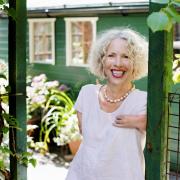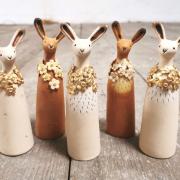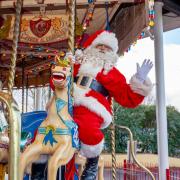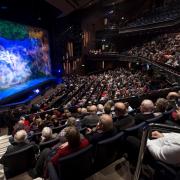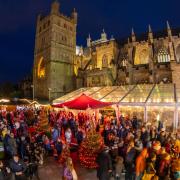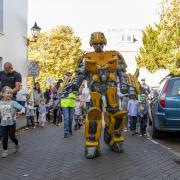July sees our countryside and gardens in the full flush of summer and it’s the time of year when bees are at their busiest, so that’s why Natural Devon has declared it Pollinators’ Month, as Dominic Acland explains

Natural Devon, a partnership of over 900 local individuals and organisations, has declared July Pollinators’ Month to celebrate the amazing insects that not only help wild and garden flowers reproduce but also pollinate many of our favourite foods. There’s a host of events taking place during the month like nature walks, festivals, courses and family activities to get involved in.
There are over 1,500 species of insect pollinators in the UK, including bees, hoverflies, wasps, butterflies, moths and beetles. Most pollination is done by wild-living species and in Devon alone there are more than 100 different bee species while over 85 hoverfly, 100 moth and 25 butterfly species have been recorded in our gardens.
But all is not rosy in those gardens or the wider landscape! Wild bee and butterfly numbers are in decline. Two of the UK’s 26 bumblebee species are now extinct and many others are disappearing from our countryside. The reasons for the decline are complex but include disease, loss of habitat, climate change and the use of pesticides. Since the 1940s up to 97 per cent of wildflower meadows in the UK have been lost through agricultural intensification and land development. Nectar and pollen in flowers are the main food source for pollinators and so with fewer flowers in the landscape there’s less food to go around.
The good news is that there are some simple steps we can take to improve the situation. The focus of the Devon Pollinators’ Month campaign is the Devon Pollinators’ Pledge and anyone who looks after land, whether that’s a garden, an allotment, a park, an orchard or a farm, is being urged to sign up and make a practical difference on their ground.

The Pledge asks you to take at least one (and preferably more) of the following actions:
1 Plant flowers. Flowers (including on shrubs and trees) provide nectar and pollen throughout the year. Particularly valuable are long flowering plants and early and late flowering plants which provide food when little else is in flower. For example: pussy willow, primroses and crocuses in spring, lavenders, meadow cranesbill and ox-eye daisies in summer, ivy and hebes in autumn, and mahonia shrubs and cyclamen in winter. From window boxes to parks – everyone can plant for pollinators! See RHS website for pollinator-friendly plants.

2 Create and protect meadows and areas rich in wild flowers. Protect and manage existing flower rich areas and where possible create new ones. In gardens sow an area with wild flower seed and leave it to flower and set seed before cutting. Alternatively, leave an area of lawn to grow long to encourage wild flowers and provide areas where bumblebees can nest, or just raise your mower blade height to save flowers from the chop.
3 Don’t be too tidy. Leave wild corners, log piles, walls and grassy banks undisturbed over winter to provide homes and shelter. Don’t cut hedges every year as they provide shelter for pollinators in winter and flowers in spring. Leave areas to grow wild and, for maximum benefit, build a bug hotel.
4 Think carefully about whether to use pesticides especially where pollinators are active or nesting or where plants are in flower. Consider control methods appropriate to your situation and only use pesticides if absolutely necessary. Organic farmer Martyn Bragg says: “We allow many wild flowers (weeds) to flourish so they flower and allow our insect population to thrive.” Consider control methods appropriate to your situation and only use pesticides if absolutely necessary.
5 Join up and learn more. Support one of the many conservation organisations campaigning for, and conserving, our wild pollinators in Devon. Lots of them organise events where you can learn to identify and help pollinators. Natural Devon wants as many people in Devon as possible to do something for pollinators – no matter how small.
To sign the Pledge and find out more about how to help pollinators go to naturaldevon.org.uk. To inspire others please tweet pictures of what you’re doing to help Devon’s pollinators: #devonpollinators @Devon_LNP
Did you know?
In the UK, the total economic value of pollinators has been estimated at about £650 million per year, with global values of over £100 billion.
Foods that depend on insect pollination include apples, cherries, pears, strawberries, blueberries, currants, raspberries, tomatoes, peas, cucumbers and courgettes.
It takes two million individual honeybee visits to flowers to produce one pound of honey. In her short six-week life each worker bee will produce just one twelfth of a teaspoon of honey herself.
Britain’s rarest bee – only in Devon!
The Six-banded nomad bee (Nomada sexfasciata) is only found in South Devon. This bee used to be scattered across southern England, but now clings on at the cliffs of Prawle Point.
Nomad bees are ‘cuckoo bees’ and, like the bird, they lay their eggs in other bees’ nests - in this case the nest of the Long-horned mining bee (Eucera longicornis). When the nomad’s larva hatches it eats the pollen and nectar stores that the host bee gathered for its own young.
The South Devon coast provides warm, south-facing cliffs for the Long-horned bees to nest in, and plentiful wildflowers to feed on. The invertebrate conservation charity Buglife is monitoring the Six-banded nomad bee population and working with others to restore wildflower-rich habitats along the coast and inland.




